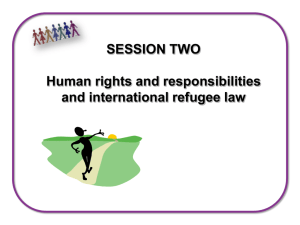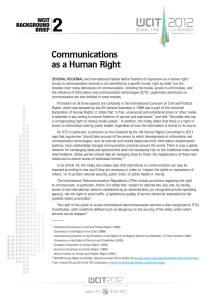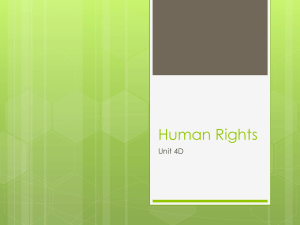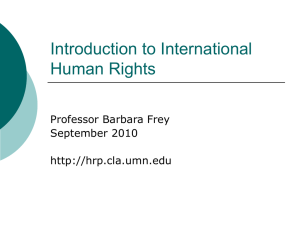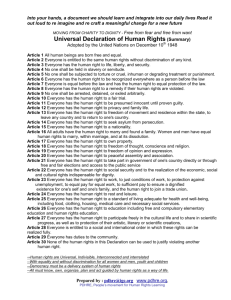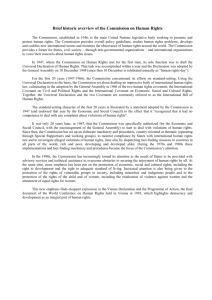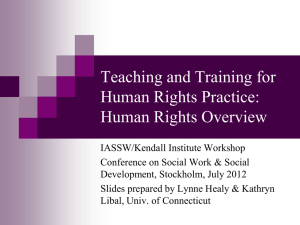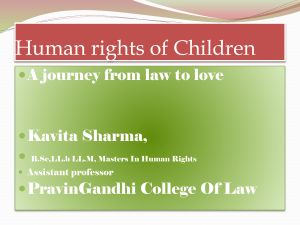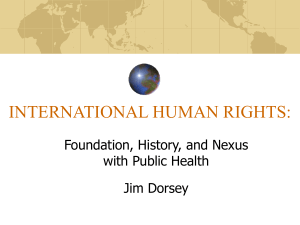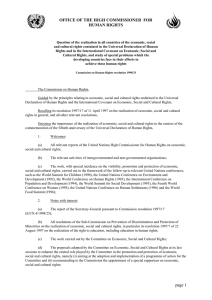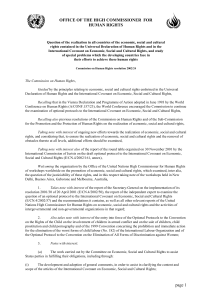presentation as a PowerPoint doc.
advertisement
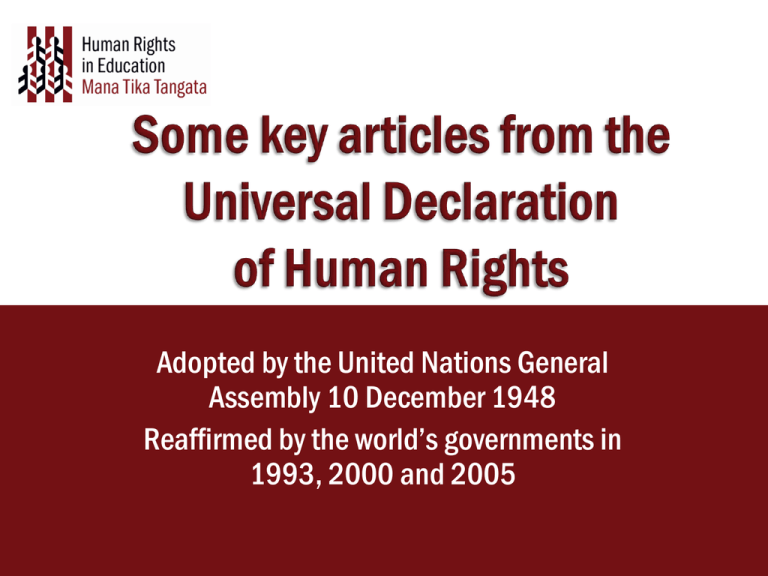
Adopted by the United Nations General Assembly 10 December 1948 Reaffirmed by the world’s governments in 1993, 2000 and 2005 “a common standard of achievement for all peoples and all nations” What do these human rights mean for our school? Article 1 All human beings are born free and equal in dignity and rights. They are endowed with reason and conscience and should act towards one another in a spirit of brotherhood. Article 2 Everyone is entitled to all the rights and freedoms set forth in this Declaration, without distinction of any kind, such as race, colour, sex, language, religion, political or other opinion, national or social origin, property, birth or other status. Article 3 Everyone has the right to life, liberty and security of person. Article 4 No one shall be held in slavery Article 5 No-one shall be subjected to torture, or to cruel, inhuman or degrading treatment or punishment Articles 8,10,11 Everyone has the right to an effective remedy…for acts violating the fundamental rights granted…by the constitution or by law. Everyone is entitled to a fair...hearing by an independent and impartial tribunal in the determination of his rights and obligations and of any criminal charge.... Everyone...has the right to be presumed innocent until proved guilty.... Article 12 No one shall be subjected to arbitrary interference with privacy, family, home or correspondence, nor to attacks upon honour and reputation. Article 16 Men and women of full age, without any limitation due to race, nationality or religion, have the right to marry and to found a family. Article 19 Freedom of expression.... Article 19 cont. Freedom...to seek, receive and impart information and ideas. Article 20 Everyone has the right to peaceful assembly and association Article 21 Everyone has the right to take part in the government of his country Article 23 Everyone has the right to work, under fair conditions Article 24 Everyone has the right to rest and leisure Article 25 Everyone has the right to a standard of living adequate for the health and well-being of himself and of his family, including food, clothing, housing and medical care and necessary social services…. Article 26 Everyone has the right to education. Article 27 Everyone has the right freely to participate in the cultural life of the community and to enjoy the arts Article 27 cont. Everyone has the right to share in scientific advancement and its benefits. Article 28 Everyone is entitled to a social and international order in which human rights can be fully realised. Article 29 Everyone has duties to the community. UN Charter Universal Declaration of Human Rights International Covenant on Civil & Political Rights International Covenant on Economic, Social & Cultural Rights Other treaties, declarations, jurisprudence incl UN Convention on the Rights of the Child UN Charter Universal Declaration of Human Rights International Covenant on Civil & Political Rights International Covenant on Economic, Social & Cultural Rights Other treaties, declarations, jurisprudence incl UN Convention on the Rights of the Child “In all actions concerning children... the best interests of the child shall be a primary consideration” UNCRoC article 3.1 “States and parties shall assure to the child who is capable of forming his or her own views the right to express those views freely in all matters affecting the child, the views of the child being given due weight in accordance with the age and maturity of the child.” UNCRoC article 12 “States and parties shall respect the responsibilities, rights and duties of parents or, where applicable, the members of the extended family or community as provided for by local custom, legal guardians or other persons legally responsible for the child, to provide, in a manner consistent with the evolving capacities of the child, appropriate direction and guidance in the exercise by the child of the rights.” UNCRoC article 5 a) b) c) d) e) development of the child’s personality, talents and mental and physical abilities to their fullest potential; development of respect for human rights… development of respect for the child’s parents, his or her own cultural identity, language and values, for the national values of the country in which the child is living, the country from which he or she may originate, and for civilisations different from his or her own; preparation…for responsible life in a free society, in the spirit of understanding, peace, tolerance, equality of the sexes, and friendship among all peoples, ethnic, national and religious groups and persons of indigenous origin; development of respect for the environment. Convention on the Rights of the Child, Article 29
